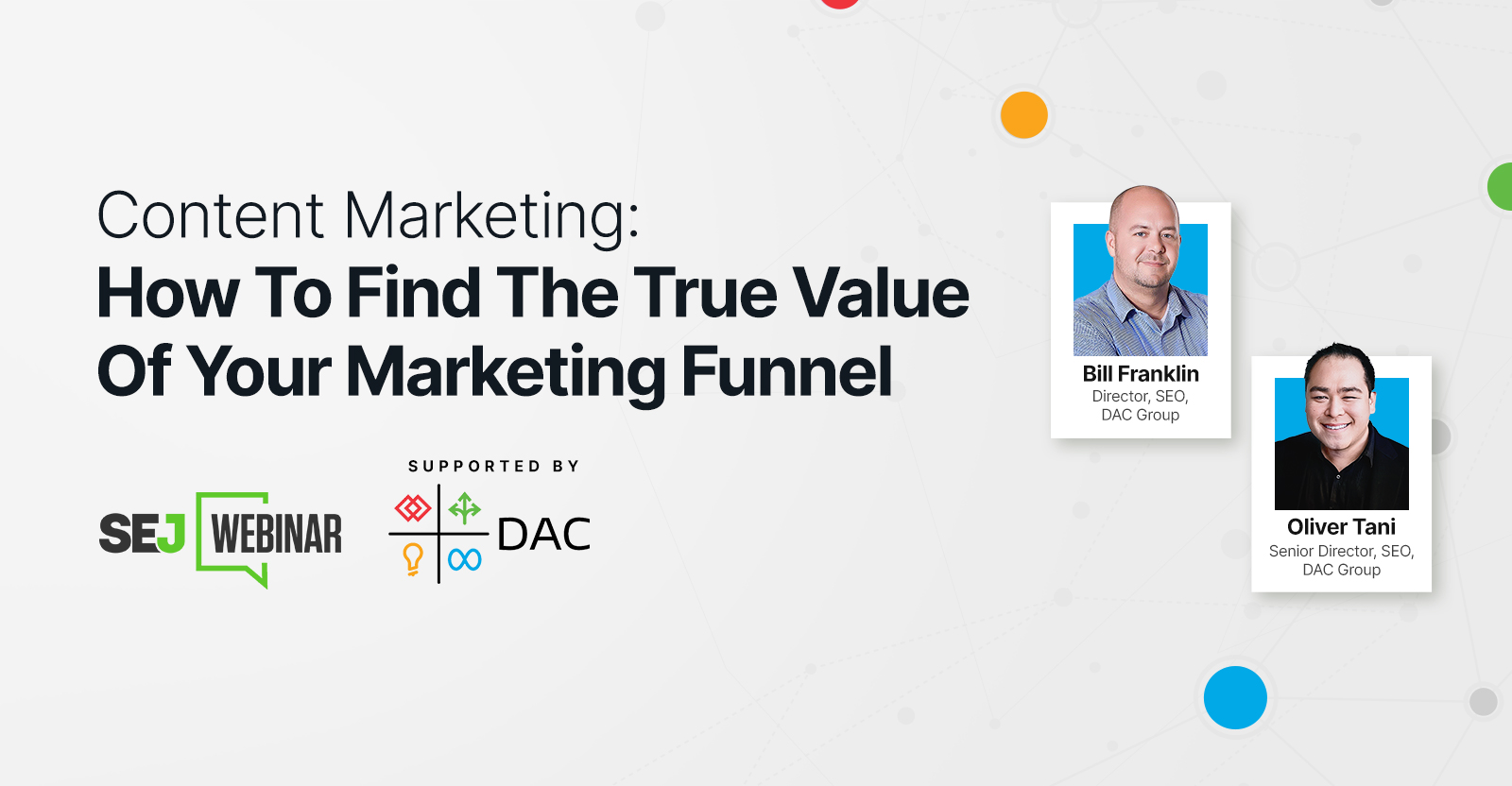SEO
Key Trends & Opportunities In Search

Optimizing your site and webpages for search is complex enough without the additional regulatory concerns and other challenges inherent to the financial industry.
Digital governance, consumer privacy and trust, information accuracy, and the rapid pace of innovation in the sector are among the going concerns for financial brands.
Whether you’re in insurance, banking, wealth management, mortgages, fintech, or another facet of the financial services industry, there are some additional issues to work into your SEO strategy (on top of general SEO best practices).
In this article, we’ll take a look at some of the key trends that leaders in marketing and SEO need to keep an eye on in the months and years ahead.
You’ll also find proven tips throughout to help improve the efficacy of your efforts to rank higher in search, convert more searchers to customers, and protect your brand while enhancing your online visibility in search.
1. Digital Transformation Is Driving Evolving Customer Needs
Even prior to the onset of the pandemic, Adobe’s 2021 Digital Trends: Financial Services & Insurance in Focus report found that 54% of financial services and insurance firms surveyed had reported unusual growth in digital/mobile visitors in the six months prior to that early 2021 survey.
Then COVID-19 changed everything.
Customers’ informational needs and the ways in which appointments, consultations, transactions, and contracts were handled changed almost overnight as much of the world went into lockdown.
Fintech and the promise of decentralized finance via cryptocurrencies had already shaken up antiquated, paper-based legacy systems and the pandemic accelerated the pace of change by years.
Adobe’s survey also found that 61% of retail banks said legacy systems were a top challenge holding their marketing and customer experience organizations back (followed by workflow issues for 44% and a lack of digital skills/capabilities for 42%).
Operational costs for fintech brands may be up to 70% lower than traditional banks, thanks to their lean operating models and structures.
Even so, says KPMG’s Anton Ruddenklau, Global Co-Leader – Fintech:
“Before COVID-19, we were already seeing an increase in the corporate venture arms of the large banks actively buying up promising fintechs and start-ups. As we emerge into the recovery and beyond, we can expect this to accelerate.
The incumbent giants are likely to acknowledge that they need a greater degree of scaled collaboration with fintech players to bring more digitized services and benefits to their customers.”
Fintech is not a clear winner in the search space by virtue of its digitized services and benefits; not by a long shot.
We’ve moved beyond all transactions and inquiries taking place in person or over the phone.
Today, financial services customers expect self-serve options at every stage of their journey, from discovery and comparing their options through consultation, transaction, and service.
Brands that are best able to meet these expectations and customers’ increasing informational needs are best-positioned to succeed in search.
How you convey these offerings in organic and local search is key.
Financial brands not only have to create the best experiences but be able to demonstrate to search engines that they are the best answer to relevant queries, as well.
Tips And Takeaways
Leverage Proper Schema Markup For All Webpages
The most commonly used Schema types in banking are Articles, Image Objects, and FAQ.
Though not specific to banking, they help search engines like Google to better understand your content.
Make Sure You Know Who Your Competitors Are
It may not be who you think.
In addition to direct competitors in your space, you may also be competing against industry publications and media, regulatory bodies and other informational sources, local businesses, YouTube channels, podcasts, and more for share of voice in the SERPs.
Conduct Surveys And Analyze Your Seo Data For Customer Insights
Consumer-centric media and ecommerce experiences have raised the bar as far as what consumers expect of content personalization.
They now expect that the technologies they interact with will programmatically learn their preferences and tailor the experience accordingly.
2. Your Opportunities To Appear In The SERPs Are Growing
As Google strives to better understand searcher intent and provide better answers to increasingly complex queries, we’re seeing more differentiation than ever in search engine results pages (SERPs).
Google’s new Multitask Unified Model, or MUM, technology is already in play.
MUM enables Google to better understand content in different languages, formats, and content types.
Now, we’re seeing new results types being tested, such as this enhanced Autocomplete box that adds an extra dimension to the results, depending on what Google perceives the searcher’s intent to be.
Optimizing for Featured Snippets is a best practice that can present valuable opportunities to expand your presence in search.
Structuring and marking up content in specific ways – as a numbered or bulleted list, or table, for example – can help Google understand when your webpage might be a good candidate for a featured snippet.
Research by BrightEdge (disclosure: my company) shows that the SERPs for financial services queries tend to contain a variety of universal listing elements depending on the type of query.
We’ve seen that higher-funnel, “I-Want-To-Know” queries like [best investment apps] and [how to invest] bring back Quick answers boxes and People Also Ask dropdowns, for example.
Understanding which SERP features are available by keyword and search intent is essential for this strategy.
Incorporating original, high-quality video and imagery in your webpage content gives you more opportunities to appear in rich results, as well.
And in local search results (the Map Pack), we saw the addition of new attributes for various sectors of the financial services industry added throughout the pandemic
Which Google Business Profile attributes are available to your listing depends on its primary category.
Banks, insurance agencies, and mortgage brokers, for example, can use attributes for online appointments, appointment links, ATMs, drive-thru services, and more.
More broadly available attributes enable you to share health and safety information, COVID-19 guidelines and safety measures, accessibility information, and more.
See the Complete Guide to Google Attributes for Local SEO to learn more.
Tips And Takeaways
Explore SERPs For Your Most Valuable Keywords
Look for opportunities to outrank competitors in unique SERPs features or by being the first-mover where opportunities for richer results may exist.
When Creating And Optimizing Content, Focus On Topical Relevance And Context
As opposed to making sure you use the keyword multiple times on a page.
Of the top 1000 banking terms, our research has found that pages that rank #1 use that top keyword just once, on average.
Context is more important than keyword density for banking.
Consider New Content Length Carefully
While we know word count is not a ranking factor, our research has found that the average word count for pages in the top three positions across the top 1000 banking terms is 1,240 words.
While this shouldn’t be considered a hard and fast rule, we do see more comprehensive content achieving higher rankings in this sector.
Be sure to analyze your own SERPs and aim to provide the most comprehensive and highest quality content for each target keyword.
3. Consumer Trust And Information Accuracy Are Increasingly Important In SEO
COVID-19 brought with it a massive transition to online and unfortunately, an associated onslaught of misinformation, cyber-attacks, scams, and fraud.
Bad actors raced to capitalize on increased online searches around and searches for payday loans, grants, jobs, and other help as consumers’ financial concerns grew.
In its pursuit to always provide the best answer for each query, Google has had its hands full algorithmically weeding out results that have the potential to negatively impact searchers.
Finance sites fall into a category Google calls Your Money or Your Life (YMYL), in which websites are held to a higher standard
A concept called E-A-T – Expertise, Authoritativeness, and Trustworthiness – factors heavily into YMYL site rankings as Google aims to surface the highest quality answers in its rankings.
Google recommends that those in the YMYL category self-assess your content, asking, “Would you feel comfortable trusting this content for issues relating to your money or your life?”
Tips And Takeaways
Get To Know Google’s Search Quality Raters Guidelines
Though not a ranking factor themselves, Google encourages content publishers to refer to this resource “for advice on great content.”
Incorporate Regular Content Audits And Updates Into Your SEO Strategy
Ensure that any outdated information is promptly removed from Google Posts, the blog, etc.
This is not only an SEO best practice but a regulatory requirement for many in the financial services sector, as well.
Don’t Ignore Your Presence In Social Media
When we look at who has the top share of voice for the top 1000 banking terms, Facebook is in the top 5 for organic winning many bank names and even non-brand terms.
Ensuring your profiles are complete and using targeted terms can give you another resource to win visibility in search beyond your website’s listings.
4. Finance Becomes Mobile-First
Visiting ATMs to withdraw for cash purchases, meeting up with a financial advisor, and visiting the local branch for lending needs are not yet obsolete but certainly giving way to more self-serve options.
Digital natives – that is, those who prefer to conduct their banking digitally and have no use for branches or offices at all – made up 32% of PwC’s 2021 Digital Banking Consumer Survey.
And often, consumers are conducting these activities on their mobile phones.
Retail banking has become an omnichannel experience for many.
And as McKinsey experts said in their article Transforming the US consumer bank for the next normal.
“To boost digital customer experience, banks need to design their solutions based on a deep understanding of what drives customer perceptions of convenience. For a long time, this meant a branch on every corner.
Today, while physical presence remains important, convenience also correlates with the ease, speed, and simplicity of an omnichannel experience.”
Google understands the importance of this ease of use, simplicity, and speed – so much so that its Page Experience update and Core Web Vitals metrics made meeting these objectives even more impactful in its search ranking algorithms.
Finance consumers are looking for intuitive apps, seamless cross-channel experiences, personalized service and offers, and near real-time decisions.
Transactions such as loan applications or mortgage pre-approvals that used to involve a series of in-person appointments and a great deal of paperwork can now come back in minutes.
It is imperative that the pages these tools live on and other informational content load near-instantly – or consumers will move on to the next result.
Tips And Takeaways
Mobile Security Is Mission-critical
With digital adoption comes enhanced consumer expectations that their privacy and financial data are being protected.
Optimize For Voice Search
With greater reliance on mobile devices and the proliferation of voice-enabled in-home assistants such as Google Home and Alexa, optimizing for these types of queries is key.
Fully 71% of consumers prefer to use voice for search queries as opposed to typing, according to PwC.
Voice-optimized content may differ in a variety of ways including structure, the intent being targeted, content length, format, and markup.
Measure And Optimize For Core Web Vitals
Your rankings will not suffer directly if this is not an area of focus. However, Google gives those who meet its CWV requirements a “boost” in search rankings and in competitive finance spaces, this could really move the needle.
Conclusion
Following Google’s best practices and keeping pace with algorithmic change is essential for SEO in the Financial Services sector.
It is also equally as important to ensure that marketers utilize market insights to stay ahead of category and consumer trends and automate to quickly fix site content for search compliance.
The competition is always high in the finance and banking sectors and with the rise of fintech, SEO can help financial brands stay on top.
More resources:
Featured Image: Billion Photos/Shutterstock
SEO
How To Write ChatGPT Prompts To Get The Best Results

ChatGPT is a game changer in the field of SEO. This powerful language model can generate human-like content, making it an invaluable tool for SEO professionals.
However, the prompts you provide largely determine the quality of the output.
To unlock the full potential of ChatGPT and create content that resonates with your audience and search engines, writing effective prompts is crucial.
In this comprehensive guide, we’ll explore the art of writing prompts for ChatGPT, covering everything from basic techniques to advanced strategies for layering prompts and generating high-quality, SEO-friendly content.
Writing Prompts For ChatGPT
What Is A ChatGPT Prompt?
A ChatGPT prompt is an instruction or discussion topic a user provides for the ChatGPT AI model to respond to.
The prompt can be a question, statement, or any other stimulus to spark creativity, reflection, or engagement.
Users can use the prompt to generate ideas, share their thoughts, or start a conversation.
ChatGPT prompts are designed to be open-ended and can be customized based on the user’s preferences and interests.
How To Write Prompts For ChatGPT
Start by giving ChatGPT a writing prompt, such as, “Write a short story about a person who discovers they have a superpower.”
ChatGPT will then generate a response based on your prompt. Depending on the prompt’s complexity and the level of detail you requested, the answer may be a few sentences or several paragraphs long.
Use the ChatGPT-generated response as a starting point for your writing. You can take the ideas and concepts presented in the answer and expand upon them, adding your own unique spin to the story.
If you want to generate additional ideas, try asking ChatGPT follow-up questions related to your original prompt.
For example, you could ask, “What challenges might the person face in exploring their newfound superpower?” Or, “How might the person’s relationships with others be affected by their superpower?”
Remember that ChatGPT’s answers are generated by artificial intelligence and may not always be perfect or exactly what you want.
However, they can still be a great source of inspiration and help you start writing.
Must-Have GPTs Assistant
I recommend installing the WebBrowser Assistant created by the OpenAI Team. This tool allows you to add relevant Bing results to your ChatGPT prompts.
This assistant adds the first web results to your ChatGPT prompts for more accurate and up-to-date conversations.
It is very easy to install in only two clicks. (Click on Start Chat.)
For example, if I ask, “Who is Vincent Terrasi?,” ChatGPT has no answer.
With WebBrower Assistant, the assistant creates a new prompt with the first Bing results, and now ChatGPT knows who Vincent Terrasi is.
 Screenshot from ChatGPT, March 2023
Screenshot from ChatGPT, March 2023You can test other GPT assistants available in the GPTs search engine if you want to use Google results.
Master Reverse Prompt Engineering
ChatGPT can be an excellent tool for reverse engineering prompts because it generates natural and engaging responses to any given input.
By analyzing the prompts generated by ChatGPT, it is possible to gain insight into the model’s underlying thought processes and decision-making strategies.
One key benefit of using ChatGPT to reverse engineer prompts is that the model is highly transparent in its decision-making.
This means that the reasoning and logic behind each response can be traced, making it easier to understand how the model arrives at its conclusions.
Once you’ve done this a few times for different types of content, you’ll gain insight into crafting more effective prompts.
Prepare Your ChatGPT For Generating Prompts
First, activate the reverse prompt engineering.
- Type the following prompt: “Enable Reverse Prompt Engineering? By Reverse Prompt Engineering I mean creating a prompt from a given text.”
 Screenshot from ChatGPT, March 2023
Screenshot from ChatGPT, March 2023ChatGPT is now ready to generate your prompt. You can test the product description in a new chatbot session and evaluate the generated prompt.
- Type: “Create a very technical reverse prompt engineering template for a product description about iPhone 11.”
 Screenshot from ChatGPT, March 2023
Screenshot from ChatGPT, March 2023The result is amazing. You can test with a full text that you want to reproduce. Here is an example of a prompt for selling a Kindle on Amazon.
- Type: “Reverse Prompt engineer the following {product), capture the writing style and the length of the text :
product =”
 Screenshot from ChatGPT, March 2023
Screenshot from ChatGPT, March 2023I tested it on an SEJ blog post. Enjoy the analysis – it is excellent.
- Type: “Reverse Prompt engineer the following {text}, capture the tone and writing style of the {text} to include in the prompt :
text = all text coming from https://www.searchenginejournal.com/google-bard-training-data/478941/”
 Screenshot from ChatGPT, March 2023
Screenshot from ChatGPT, March 2023But be careful not to use ChatGPT to generate your texts. It is just a personal assistant.
Go Deeper
Prompts and examples for SEO:
- Keyword research and content ideas prompt: “Provide a list of 20 long-tail keyword ideas related to ‘local SEO strategies’ along with brief content topic descriptions for each keyword.”
- Optimizing content for featured snippets prompt: “Write a 40-50 word paragraph optimized for the query ‘what is the featured snippet in Google search’ that could potentially earn the featured snippet.”
- Creating meta descriptions prompt: “Draft a compelling meta description for the following blog post title: ’10 Technical SEO Factors You Can’t Ignore in 2024′.”
Important Considerations:
- Always Fact-Check: While ChatGPT can be a helpful tool, it’s crucial to remember that it may generate inaccurate or fabricated information. Always verify any facts, statistics, or quotes generated by ChatGPT before incorporating them into your content.
- Maintain Control and Creativity: Use ChatGPT as a tool to assist your writing, not replace it. Don’t rely on it to do your thinking or create content from scratch. Your unique perspective and creativity are essential for producing high-quality, engaging content.
- Iteration is Key: Refine and revise the outputs generated by ChatGPT to ensure they align with your voice, style, and intended message.
Additional Prompts for Rewording and SEO:
– Rewrite this sentence to be more concise and impactful.
– Suggest alternative phrasing for this section to improve clarity.
– Identify opportunities to incorporate relevant internal and external links.
– Analyze the keyword density and suggest improvements for better SEO.
Remember, while ChatGPT can be a valuable tool, it’s essential to use it responsibly and maintain control over your content creation process.
Experiment And Refine Your Prompting Techniques
Writing effective prompts for ChatGPT is an essential skill for any SEO professional who wants to harness the power of AI-generated content.
Hopefully, the insights and examples shared in this article can inspire you and help guide you to crafting stronger prompts that yield high-quality content.
Remember to experiment with layering prompts, iterating on the output, and continually refining your prompting techniques.
This will help you stay ahead of the curve in the ever-changing world of SEO.
More resources:
Featured Image: Tapati Rinchumrus/Shutterstock
SEO
Measuring Content Impact Across The Customer Journey

Understanding the impact of your content at every touchpoint of the customer journey is essential – but that’s easier said than done. From attracting potential leads to nurturing them into loyal customers, there are many touchpoints to look into.
So how do you identify and take advantage of these opportunities for growth?
Watch this on-demand webinar and learn a comprehensive approach for measuring the value of your content initiatives, so you can optimize resource allocation for maximum impact.
You’ll learn:
- Fresh methods for measuring your content’s impact.
- Fascinating insights using first-touch attribution, and how it differs from the usual last-touch perspective.
- Ways to persuade decision-makers to invest in more content by showcasing its value convincingly.
With Bill Franklin and Oliver Tani of DAC Group, we unravel the nuances of attribution modeling, emphasizing the significance of layering first-touch and last-touch attribution within your measurement strategy.
Check out these insights to help you craft compelling content tailored to each stage, using an approach rooted in first-hand experience to ensure your content resonates.
Whether you’re a seasoned marketer or new to content measurement, this webinar promises valuable insights and actionable tactics to elevate your SEO game and optimize your content initiatives for success.
View the slides below or check out the full webinar for all the details.
SEO
How to Find and Use Competitor Keywords

Competitor keywords are the keywords your rivals rank for in Google’s search results. They may rank organically or pay for Google Ads to rank in the paid results.
Knowing your competitors’ keywords is the easiest form of keyword research. If your competitors rank for or target particular keywords, it might be worth it for you to target them, too.
There is no way to see your competitors’ keywords without a tool like Ahrefs, which has a database of keywords and the sites that rank for them. As far as we know, Ahrefs has the biggest database of these keywords.
How to find all the keywords your competitor ranks for
- Go to Ahrefs’ Site Explorer
- Enter your competitor’s domain
- Go to the Organic keywords report
The report is sorted by traffic to show you the keywords sending your competitor the most visits. For example, Mailchimp gets most of its organic traffic from the keyword “mailchimp.”


Since you’re unlikely to rank for your competitor’s brand, you might want to exclude branded keywords from the report. You can do this by adding a Keyword > Doesn’t contain filter. In this example, we’ll filter out keywords containing “mailchimp” or any potential misspellings:


If you’re a new brand competing with one that’s established, you might also want to look for popular low-difficulty keywords. You can do this by setting the Volume filter to a minimum of 500 and the KD filter to a maximum of 10.


How to find keywords your competitor ranks for, but you don’t
- Go to Competitive Analysis
- Enter your domain in the This target doesn’t rank for section
- Enter your competitor’s domain in the But these competitors do section


Hit “Show keyword opportunities,” and you’ll see all the keywords your competitor ranks for, but you don’t.


You can also add a Volume and KD filter to find popular, low-difficulty keywords in this report.


How to find keywords multiple competitors rank for, but you don’t
- Go to Competitive Analysis
- Enter your domain in the This target doesn’t rank for section
- Enter the domains of multiple competitors in the But these competitors do section


You’ll see all the keywords that at least one of these competitors ranks for, but you don’t.


You can also narrow the list down to keywords that all competitors rank for. Click on the Competitors’ positions filter and choose All 3 competitors:


- Go to Ahrefs’ Site Explorer
- Enter your competitor’s domain
- Go to the Paid keywords report


This report shows you the keywords your competitors are targeting via Google Ads.
Since your competitor is paying for traffic from these keywords, it may indicate that they’re profitable for them—and could be for you, too.
You know what keywords your competitors are ranking for or bidding on. But what do you do with them? There are basically three options.
1. Create pages to target these keywords
You can only rank for keywords if you have content about them. So, the most straightforward thing you can do for competitors’ keywords you want to rank for is to create pages to target them.
However, before you do this, it’s worth clustering your competitor’s keywords by Parent Topic. This will group keywords that mean the same or similar things so you can target them all with one page.
Here’s how to do that:
- Export your competitor’s keywords, either from the Organic Keywords or Content Gap report
- Paste them into Keywords Explorer
- Click the “Clusters by Parent Topic” tab


For example, MailChimp ranks for keywords like “what is digital marketing” and “digital marketing definition.” These and many others get clustered under the Parent Topic of “digital marketing” because people searching for them are all looking for the same thing: a definition of digital marketing. You only need to create one page to potentially rank for all these keywords.


2. Optimize existing content by filling subtopics
You don’t always need to create new content to rank for competitors’ keywords. Sometimes, you can optimize the content you already have to rank for them.
How do you know which keywords you can do this for? Try this:
- Export your competitor’s keywords
- Paste them into Keywords Explorer
- Click the “Clusters by Parent Topic” tab
- Look for Parent Topics you already have content about
For example, if we analyze our competitor, we can see that seven keywords they rank for fall under the Parent Topic of “press release template.”


If we search our site, we see that we already have a page about this topic.


If we click the caret and check the keywords in the cluster, we see keywords like “press release example” and “press release format.”


To rank for the keywords in the cluster, we can probably optimize the page we already have by adding sections about the subtopics of “press release examples” and “press release format.”
3. Target these keywords with Google Ads
Paid keywords are the simplest—look through the report and see if there are any relevant keywords you might want to target, too.
For example, Mailchimp is bidding for the keyword “how to create a newsletter.”


If you’re ConvertKit, you may also want to target this keyword since it’s relevant.
If you decide to target the same keyword via Google Ads, you can hover over the magnifying glass to see the ads your competitor is using.


You can also see the landing page your competitor directs ad traffic to under the URL column.


Learn more
Check out more tutorials on how to do competitor keyword analysis:
-

 PPC5 days ago
PPC5 days ago19 Best SEO Tools in 2024 (For Every Use Case)
-

 MARKETING7 days ago
MARKETING7 days agoStreamlining Processes for Increased Efficiency and Results
-
SEARCHENGINES7 days ago
Daily Search Forum Recap: April 17, 2024
-

 PPC7 days ago
PPC7 days ago97 Marvelous May Content Ideas for Blog Posts, Videos, & More
-

 SEO7 days ago
SEO7 days agoAn In-Depth Guide And Best Practices For Mobile SEO
-
SEARCHENGINES5 days ago
Daily Search Forum Recap: April 18, 2024
-

 MARKETING6 days ago
MARKETING6 days agoEcommerce evolution: Blurring the lines between B2B and B2C
-
SEARCHENGINES4 days ago
Daily Search Forum Recap: April 19, 2024








You must be logged in to post a comment Login